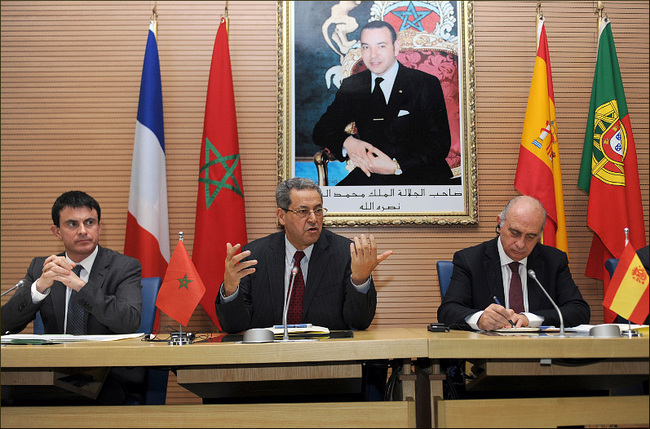 Moroccan and Spanish police are working together to safeguard travellers from terrorism during the busy holiday season.
Moroccan and Spanish police are working together to safeguard travellers from terrorism during the busy holiday season.
To protect tourists and expats travelling to Morocco for the holiday season, special units of the Royal Gendarmerie and Spain’s Guardia Civil are monitoring the Mediterranean.
Joint patrols will run “throughout the holiday period in the regions of Andalusia, Valencia, the Balearic Islands and Spanish and Moroccan waters and airspace”, Spanish Interior Minister Jorge Fernandez Diaz said.
Portugal and France are also participating in the security operation.
The major initiative got off the ground last month after Fernandez Diaz met his Moroccan counterpart Mohand Laenser, during a visit to the kingdom by King Juan Carlos and a delegation of Spanish government and business figures.
The ministers agreed that their countries’ geographical proximity called for a joint approach to security.
“Spain is Europe’s outer border, and without fruitful co-operation with Morocco, addressing security threats would be impossible,” Fernandez Diaz told reporters in Rabat.
“Security co-operation has had a positive impact on efforts to curb terrorism, drug trafficking and illegal immigration,” Laenser said.
Even before the ministerial meeting, Morocco and Spain had already decided to set up police co-operation centres at the Tangier-Med and Algeciras port complexes.
The purpose of the centres is to support the joint fight against terrorism and cross-border crime, Laenser said.
The expanded partnership now under way aims to both boost holiday season security and promote international counter-terrorism efforts, journalist Abdelali Wahili told Magharebia.
The initiative can also help curb radicalism and salafism among émigrés, noted Rachid Mastouri, an analyst of Morocco-EU relations.
“The spread of extremist ideologies among Moroccans living overseas (MREs) is now a major cause for concern, which requires special attention from both the host countries and Morocco,” he said.
This year has indeed witnessed a wave of expulsions of overseas Moroccans over their involvement in the promotion of Salafist Jihadistideology.
In May, the Spanish interior minister cited radical salafism as the reason for expelling Noureddine Ziani, a Moroccan national who chaired the Union of Islamic Cultural Centres in Catalonia.
More than one dozen Moroccans were expelled from France last year for the same reason.
Among them was a 24-year-old who posed a “threat to national security”, French authorities said. The young Moroccan was accused of posting messages on jihadist websites and encouraging terror attacks.
At the time, Interior Minister Manuel Valls stated that France would “show no flexibility towards those within its territory who would attack its institutions and seek to spread radical and backward ideology”.
By Hassan Benmehdi in Casablanca for Magharebia







